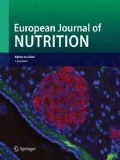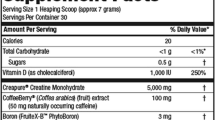Abstract
Purpose
The impact of diet on endurance performance and cognitive function has been extensively researched in controlled settings, but there are limited observational data in field situations. This study examines relationships between nutrient intake and cognitive function following endurance exercise amongst a group of 33 recreational runners and walkers.
Methods
All participants (mean age of 43.2 years) took part in a long-distance walking event and completed diet diaries to estimate nutrient intake across three-time periods (previous day, breakfast and during the event). Anthropometric measurements were recorded. Cognitive tests, covering word recall, ruler drop and trail making tests (TMT) A and B were conducted pre- and post-exercise. Participants rated their exercise level on a validated scale. Nutrient intake data were summarised using principal components analysis to identify a nutrient intake pattern loaded towards water intake across all time periods. Regression analysis was used to ascertain relationships between water intake component scores and post-exercise cognitive function, controlling for anthropometric measures and exercise metrics (distance, duration and pace).
Results
Participants rated their exercise as ‘hard-heavy’ (score 14.4, ±3.2). Scores on the water intake factor were associated with significantly faster TMT A (p = 0.001) and TMT B (p = 0.005) completion times, and a tendency for improved short-term memory (p = 0.090). Water intake scores were not associated with simple reaction time (assessed via the ruler drop test).
Conclusion
These data are congruent with experimental research demonstrating a benefit of hydration on cognitive function. Further field research to confirm this relationship, supported with precise measures of body weight, is needed.
Similar content being viewed by others
References
Gopinathan PM, Pichan G, Sharma VM (1988) Role of dehydration in heat stress-induced variations in mental performance. Arch Environ Health 43:15–17
Cian C, Koulmann N, Barraud PA, Raphel C, Jimenez C, Melin B (2000) Influence of variations in body hydration: effect of hyperhydration, heat stress, and exercise-induced dehydration. J Psychophysiol 14:29–36
Ganio MS, Armstrong LE, Casa DJ et al (2011) Mild dehydration impairs mood and cognitive performance in men. Br J Nutr 106:1535–1543
Armstrong LE, Ganio MS, Lee L et al (2010) Mild dehydration degrades mood and symptoms not cognitive performance in females: a placebo-controlled study. FASEB J 24
Sharma VM, Sridharan K, Pichan G, Panwar MR (1986) Influence of heat-stress induced dehydration on mental functions. Ergonomics 29:791–799
Hancock PA, Vasmatzidis I (2003) Effects of heat stress on cognitive performance: the current state of knowledge. Int J Hyperthermia 19:355–372
Ramsey JD (1995) Task performance in heat: a review. Ergonomics 38:154–165
Cian C, Barraud PA, Melin B, Raphel C (2001) Effects of water ingestion on cognitive function after heat stress or exercise-induced dehydration. Int J Psychophysiol 42:243–251
Szinnai G, Schachinger H, Arnaud MJ, Linder L, Keller U (2005) Effect of water deprivation on cognitive-motor performance in healthy men and women. Am J Physiol Integr Comp Physiol 289:R275–R280
Glade MJ (2010) Caffeine—Not just a stimulant. Nutrition 26:932–938
Smith A (2002) Effects of caffeine on human behavior. Food Chem Toxicol 40:1243–1255
Silverman K, Evans SM, Strain EC, Griffiths RR (1992) Withdrawal syndrome after the double-blind cessation of caffeine consumption. N Engl J Med 327:1109–1114
Benton D (2011) Dehydration influences mood and cognition: a plausible hypothesis? Nutrients 3:555–573
Haskell CF, Kennedy DO, Wesnes KA, Scholey AB (2005) Cognitive and mood improvements of caffeine in habitual consumers and habitual non-consumers of caffeine. Psychopharmacology 179:813–825
Oei A, Hartley LR (2005) The effects of caffeine and expectancy on attention and memory. Hum Psychopharmacol 20:193–202
Smith A (2009) Effects of caffeine in chewing gum on mood and attention. Hum Psychopharmacol 24:239–247
Childs E, de Wit H (2006) Subjective, behavioral, and physiological effects of acute caffeine in light, nondependent caffeine users. Psychopharmacology 185:514–523
Brisswalter J, Collardeau M, Rene A (2002) Effects of acute physical exercise characteristics on cognitive performance. Sports Med 32:555–566
Lieberman HR (2007) Hydration and cognition: a critical review and recommendations for future research. J Am Coll Nutr 26:555S–561S
Davranche K, Audiffren M, Denjean A (2006) A distributional analysis of the effect of physical exercise on a choice reaction time task. J Sports Sci 24:323–329. doi:10.1080/02640410500132165
Audiffren M, Tomporowski PD, Zagrodnik J (2008) Acute aerobic exercise and information processing: energizing motor processes during a choice reaction time task. Acta Psychol 129:410–419. doi:10.1016/j.actpsy.2008.09.006
Ozyemisci-Taskiran O, Gunendi Z, Bolukbasi N, Beyazova M (2008) The effect of a single session of submaximal aerobic exercise on premotor fraction of reaction time: an electromyographic study. Clin Biomech 23:231–235
Jensky-Squires NE, Dieli-Conwright CM, Rossuello A, Erceg DN, McCauley S, Schroeder ET (2008) Validity and reliability of body composition analysers in children and adults. Br J Nutr 100:859–865
Borg G (1970) Perceived exertion as an indicator of somatic stress. Scand J Rehabil Med 2:92–98
Woodworth R, Schlosberg H (1954) Experimental psychology. Revised. Metheun, London
Brand N, Jolles J (1985) Learning and retrieval rate of words presented auditorily and visually. J Gen Psychol 112:201–210
Tombaugh TN (2004) Trail making test A and B: normative data stratified by age and education. Arch Clin Neuropsychol 19(2):203–214. doi:10.1016/s0887-6177(03)00039-8
Nelson M, Atkinson M, Meyer T (1997) A photographic atlas of food portion sizes. MAFF Publications, London
Collardeau M, Brisswalter J, Vercruyssen F, Audiffren M, Goubault C (2001) Single and choice reaction time during prolonged exercise in trained subjects: influence of carbohydrate availability. Eur J Appl Physiol 86:150–156. doi:10.1007/s004210100513
Lieberman HR, Falco CM, Slade SS (2002) Carbohydrate administration during a day of sustained aerobic activity improves vigilance, as assessed by a novel ambulatory monitoring device, and mood. Am J Clin Nutr 76:120–127
Benton D, Ruffin MP, Lassel T, Nabb S, Messaoudi M, Vinoy S et al (2003) The delivery rate of dietary carbohydrates affects cognitive performance in both rats and humans. Psychopharmacology 166:86–90. doi:10.1007/s00213-002-1334-5
Stevenson EJ, Astbury NM, Simpson EJ, Taylor MA, MacDonald IA (2009) Fat oxidation during exercise and satiety during recovery are increased following a low-glycemic index breakfast in sedentary women. J Nutr 139:890–897. doi:10.3945/jn.108.101956
Coles K, Tomporowski PD (2008) Effects of acute exercise on executive processing, short-term and long-term memory. J Sports Sci 26:333–344. doi:10.1080/02640410701591417
Tomporowski PD (2003) Effects of acute bouts of exercise on cognition. Acta Psychol 112:297–324
Hamouti N, Del Coso J, Avila A, Mora-Rodriguez R (2010) Effects of athletes’ muscle mass on urinary markers of hydration status. Eur J Appl Physiol 109:213–219
Maughan RJ, Shirreffs SM (2010) Dehydration and rehydration in competitive sport. Scand J Med Sci Sports 20:40–47
Armstrong L (2007) Assessing hydration status: the elusive gold standard. J Am Coll Nutr 26:575S–584S
Grandjean AC, Grandjean NR (2007) Dehydration and cognitive performance. J Am Coll Nutr 26:549S–554S
Hogervost E, Riedel W, Asker J, Jolles J (1996) Cognitive performance after strenuous physical exercise. Percept Mot Skills 83:479–488
Jiménez-Pavón D, Romeo J, Cervantes-Borunda M, Ortega FB, Ruiz JR, España-Romero V, Marcos A, Castillo MJ (2011) Effects of a running bout in the heat on cognitive performance. J Exerc Sci Fit 9:58–64
Bandelow S, Maughan RJ, Shireeffs S et al (2010) The effects of exercise, heat, cooling and dehydration strategies on cognitive function in football players. Scand J Med Sci Sports 20(Suppl 3):48–160
Acknowledgments
Thanks to all Long Distance Walking Association event organisers who not only granted permission for this research to be conducted, but were also of great assistance in recruitment of participants.
Author information
Authors and Affiliations
Corresponding author
Rights and permissions
About this article
Cite this article
Benefer, M.D., Corfe, B.M., Russell, J.M. et al. Water intake and post-exercise cognitive performance: an observational study of long-distance walkers and runners. Eur J Nutr 52, 617–624 (2013). https://doi.org/10.1007/s00394-012-0364-y
Received:
Accepted:
Published:
Issue Date:
DOI: https://doi.org/10.1007/s00394-012-0364-y




